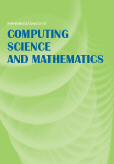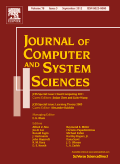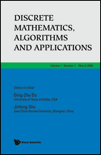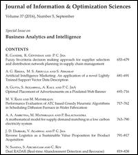
ANNALS OF MATHEMATICS AND ARTIFICIAL INTELLIGENCE
Scope & Guideline
Exploring the Nexus of Numbers and Intelligence
Introduction
Aims and Scopes
- Mathematical Foundations of AI:
The journal emphasizes rigorous mathematical frameworks that underpin artificial intelligence algorithms, including logic, probability, and optimization techniques. - Algorithm Development and Optimization:
It showcases research on novel algorithms and optimization strategies for various applications, including machine learning, data mining, and decision-making processes. - Interdisciplinary Applications:
The journal encourages submissions that demonstrate the application of AI techniques in diverse fields such as robotics, healthcare, and social systems, highlighting the practical relevance of mathematical theories. - Theoretical Insights into AI Mechanisms:
Research contributing to the theoretical understanding of AI mechanisms, including learning algorithms, decision processes, and cognitive modeling, is a core focus. - Data-Driven Decision-Making:
The journal promotes studies that integrate mathematical models with data analytics to enhance decision-making capabilities in complex systems.
Trending and Emerging
- Machine Learning Enhancements:
There is a significant increase in research focused on enhancing machine learning algorithms, particularly in areas like deep learning, reinforcement learning, and novel architectures. - AI in Robotics and Automation:
The integration of AI in robotics has gained momentum, with a focus on safe and robust robot behavior, as well as the development of intelligent systems capable of real-time decision-making. - Interdisciplinary Research:
Emerging themes reflect a growing trend towards interdisciplinary research, combining insights from various fields such as biology, economics, and social sciences with mathematical AI applications. - Quantum Computing and AI:
Recent papers indicate an increasing interest in the intersection of quantum computing and AI, exploring how quantum algorithms can enhance traditional machine learning techniques. - Complex Systems and Multi-Agent Systems:
Research on complex systems and multi-agent systems is trending, with a focus on collaborative behaviors, negotiation strategies, and dynamic interactions among agents.
Declining or Waning
- Traditional Logic Programming:
Research in traditional logic programming has decreased, potentially overshadowed by advancements in machine learning and neural networks that offer more dynamic approaches to problem-solving. - Basic Statistical Methods:
The emphasis on foundational statistical methods appears to be waning as researchers increasingly adopt more complex and computationally intensive techniques that align with modern AI applications. - Classic Optimization Techniques:
While optimization remains a crucial aspect of AI, there is a noticeable decline in papers focusing on classic optimization methods, as newer, more innovative techniques gain traction. - Single-Domain Applications:
Research that focuses solely on single-domain applications without interdisciplinary integration has become less common, as the trend shifts towards more complex, multi-domain approaches. - Static Models of Decision Making:
The focus on static models for decision-making processes is declining, with a growing preference for dynamic models that better capture the complexities of real-world scenarios.
Similar Journals

International Journal of Computing Science and Mathematics
Charting New Territories in Computational Theory and PracticeThe International Journal of Computing Science and Mathematics, published by INDERSCIENCE ENTERPRISES LTD, is a pivotal platform for the dissemination of cutting-edge research in the intertwined disciplines of computing science and mathematics. With an ISSN of 1752-5055 and an E-ISSN of 1752-5063, the journal primarily serves the academic community engaged in applied mathematics, computational mathematics, theoretical computer science, and more, making significant contributions that resonate across various fields of technology and science. While the journal is currently categorized in the Q4 quartile for multiple related fields, including Applied Mathematics and Computational Theory, it continues to strive towards advancing the knowledge and practice within these areas. Spanning years from 2007 to 2010 and again from 2012 to 2024, the journal seeks to publish high-quality, peer-reviewed articles that not only address theoretical advancements but also explore practical applications of computing science in mathematical contexts, thereby fostering collaboration among researchers, professionals, and students alike. Please note that this journal is not available as Open Access, thus ensuring a curated content selection intended for dedicated research communities.

JOURNAL OF COMPUTER AND SYSTEM SCIENCES
Exploring innovative theories in computer and applied mathematics.The Journal of Computer and System Sciences is a distinguished publication founded in 1967 and continually striving to push the boundaries of knowledge in computer science and applied mathematics. Published by Academic Press Inc, Elsevier Science, this journal boasts impressive credentials, holding a Q1 quartile ranking across multiple categories including Applied Mathematics, Computational Theory and Mathematics, Computer Networks and Communications, and Theoretical Computer Science as of 2023. With a focus on innovative research and comprehensive theoretical developments, this journal serves as a pivotal forum for authors and readers alike, facilitating cutting-edge contributions to the field. The journal is not currently open access, providing a curated selection of high-quality articles for its subscription residents. By engaging with this journal, researchers, professionals, and students can gain insight into the latest trends, prominent methodologies, and significant findings that shape the modern landscape of computing and systems analysis.

IEEE Computational Intelligence Magazine
Pioneering Research for a Smarter TomorrowIEEE Computational Intelligence Magazine, published by the esteemed IEEE-INST ELECTRICAL ELECTRONICS ENGINEERS INC, is an essential resource for researchers and professionals in the fields of Artificial Intelligence and Theoretical Computer Science. With a robust Q1 ranking in both categories for 2023, this magazine stands out as a leader in disseminating cutting-edge research and innovative applications within computational intelligence. As an invaluable conduit for knowledge, it covers a diverse range of topics, including but not limited to machine learning, neural networks, and data mining. The magazine is particularly recognized for its interdisciplinary approach, bridging gaps between theory and application while contributing to advancements in technology and society. Although it does not offer open access, the insights provided are critical for staying at the forefront of this rapidly evolving discipline. Join a community of like-minded scholars and practitioners by exploring the latest findings and trends published from 2006 to 2024, operating from its headquarters at 445 Hoes Lane, Piscataway, NJ, United States.

Information Technology and Control
Driving excellence in information technology and systems.Information Technology and Control, published by Kaunas University of Technology, is a prominent open access journal dedicated to the fields of computer science, control and systems engineering, and electrical and electronic engineering. With an ISSN of 1392-124X and a notable reputation, the journal has continuously contributed to the dissemination of innovative research since its establishment in 2008. As of 2023, it ranks in the Q3 quartile for Computer Science Applications and in the Q2 quartile for both Control and Systems Engineering and Electrical and Electronic Engineering, reflecting its growing influence in these disciplines. The journal provides a platform for the latest developments in technologies driving the industry forward and encourages an interdisciplinary approach to problem-solving. With open-access solutions implemented in 2020, it ensures that research findings are readily accessible to a global audience, supporting knowledge transfer and collaboration among researchers, professionals, and students alike. This inaugural introduction underscores the journal's commitment to fostering innovation and excellence in the rapidly evolving landscape of information technology and control.

BIT NUMERICAL MATHEMATICS
Pioneering Innovations in Applied Mathematics.BIT Numerical Mathematics, published by Springer, is a prestigious journal in the field of Applied Mathematics and Computational Mathematics, with an ISSN of 0006-3835 and an E-ISSN of 1572-9125. Since its inception in 1961, the journal has become a cornerstone for researchers and practitioners alike, offering high-quality articles that advance the understanding and application of numerical methods in various domains. With its impressive 2023 rankings in the Q1 category for multiple disciplines—including Applied Mathematics, Computational Mathematics, Computer Networks and Communications, and Software—the journal consistently showcases significant contributions to the mathematical community. Although it does not offer Open Access, BIT Numerical Mathematics continues to reach a vast audience through its rigorous peer-reviewed content. As it converges towards 2024, the journal remains committed to publishing cutting-edge research that addresses fundamental challenges in numerical analysis and algorithm development, ensuring its relevance in an ever-evolving scientific landscape.

Discrete Mathematics Algorithms and Applications
Exploring New Dimensions in Algorithms and Their Applications.Discrete Mathematics Algorithms and Applications, published by World Scientific Publishing Co Pte Ltd, stands as a pivotal resource in the field of discrete mathematics and combinatorics since its inception in 2009, with a convergence period extending to 2024. The journal holds an esteemed position within its category, ranked in the Q3 quartile according to latest metrics, recognized for its qualitative contributions to the academic community. With an ISSN of 1793-8309 and an E-ISSN of 1793-8317, it serves as a vital conduit for disseminating innovative research focused on algorithms and their applications within discrete mathematics. Although currently not an open access journal, it provides access to valuable insights and findings that are crucial for researchers, professionals, and students seeking to advance their understanding and application of discrete mathematical concepts. Based in Singapore, the journal continues to promote rigorous scholarly discourse and is a key publication for those involved in advancing the discipline.

JOURNAL OF INFORMATION & OPTIMIZATION SCIENCES
Transforming complex challenges into optimized solutions.JOURNAL OF INFORMATION & OPTIMIZATION SCIENCES, published by TARU PUBLICATIONS, is a vital platform for researchers and practitioners in the field of information science and optimization techniques. With a focus on the application of mathematical and computational methods to solve complex problems in various domains, this journal aims to advance knowledge and encourage innovative thinking. The journal's ISSN is 0252-2667 and the E-ISSN is 2169-0103. Although currently not Open Access, it strives to provide high-quality research that significantly contributes to the industry. With a commitment to rigor and excellence, the JOURNAL OF INFORMATION & OPTIMIZATION SCIENCES is essential for anyone dedicated to enhancing their understanding and application of optimization methodologies in an ever-evolving technological landscape.

Scalable Computing-Practice and Experience
Connecting Researchers and Practitioners in ComputingScalable Computing - Practice and Experience, published by UNIV VEST TIMISOARA, stands as a significant platform for research and discourse in the realm of computer science, particularly focusing on practical applications and scalability in computing systems. Established in 2005, it aims to bridge the gap between theoretical advancements and real-world implementations, catering to a diverse readership that includes researchers, professionals, and students who are keen on exploring innovative computing practices. With an H-index reflective of its contribution and a Category Quartile of Q3 in Computer Science (miscellaneous), the journal offers a rich repository of knowledge, albeit currently not open access, from its base in Timisoara, Romania. The journal is included in Scopus rankings, underscoring its relevancy with a current rank of #144 out of 232 in the General Computer Science category, placing it in the 38th percentile. It invites contributions that expand the horizons of scalable computing methodologies and experiences, making it a vital resource for those engaged in this rapidly evolving field.

MACHINE LEARNING
Empowering Researchers to Transform Ideas into ImpactMACHINE LEARNING is a premier academic journal published by SPRINGER, dedicated to advancing the field of artificial intelligence and software engineering. Established in 1986, this journal has consistently showcased pioneering research and innovative methodologies that facilitate the understanding and application of machine learning techniques across various domains. With an impressive impact factor reflecting its high-quality publications, it is classified within the top quartile (Q1) in both Artificial Intelligence and Software categories as of 2023, underscoring its critical role in these fields. The journal boasts significant Scopus rankings, placing it at the 45th and 54th positions, respectively, in Computer Science - Software and Computer Science - Artificial Intelligence, further validating its stature as a vital resource for researchers, professionals, and students alike. While not an open-access journal, MACHINE LEARNING ensures that its comprehensive peer-reviewed articles are widely circulated, fostering academic dialogue and innovation. The journal continues to be a go-to platform for cutting-edge research, providing invaluable insights and contributions that drive the future of machine learning.

International Journal of Mathematics and Computer Science
Fostering Excellence in Mathematical and Computational ResearchThe International Journal of Mathematics and Computer Science (ISSN: 1814-0424, E-ISSN: 1814-0432), published by Lebanese University, serves as a vital platform for disseminating innovative research and advancements in the fields of mathematics and computer science. With a compelling range of topics including Algebra, Applied Mathematics, Computational Mathematics, and Statistical Analysis, this journal caters to a broad audience of researchers, professionals, and students. Spanning the years from 2017 to 2025, it has established a presence in several key quartiles, including Q3 rankings in Applied Mathematics and Computational Mathematics, and a Q4 ranking in Algebra and Number Theory. While currently not an open-access journal, it provides valuable insights through its rigorous peer-reviewed process, enhancing its relevance in both theoretical and applied domains. Furthermore, its presence in Scopus rankings reflects its commitment to quality, making it an essential resource for anyone looking to explore the intersection of mathematics and computer science.